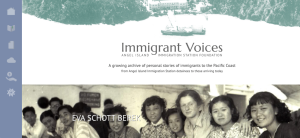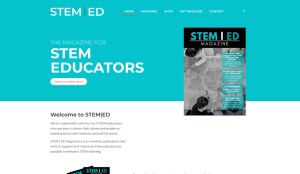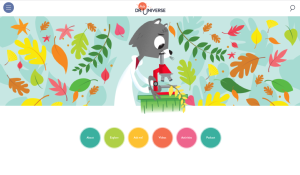General Interest
Back to Top
|
 |
|
Following the Science
|
Science |
|
Following the Science is a data visualization project that celebrates the collaborative efforts of the global science community to help humankind understand and survive the pandemic. A testament to the value of empirical research, a feel-good perspective on the pandemic, and a toast to the hard work of science, the project explores research about COVID-19 published on PubMed Central (an online database of biomedical and life sciences research articles). In 2020, about 1 in 10 articles added to PubMed Central was related to coronaviruses. Using animated data visualizations, Following the Science honors the synergistic work of the researchers behind those articles, illustrating cooperation across the globe and across disciplines. Simply scroll down the page to view the project, and navigate all the way to the bottom to learn about the methodology behind it. Following the Science was created by Jeff MacInnes, a data scientist, visualization designer, and visual storyteller. [HCL] |
|





|
|
 |
|
Introduction to College Research
|
Social studies |
|
Readers preparing to start college in the fall, as well as those working on an independent research project, may enjoy this useful textbook covering research basics. Written by Walter D. Butler, Aloha Sargent, and Kelsey Smith (a team of California Community College librarians), Introduction to College Research helps readers hone important skills, with information about literacy tools, research strategies, fact checking methods, and much more. The textbook is available for online reading and can also be downloaded as a PDF, EPUB, or MOBI file. Dive in by clicking the "Read Book" button. The Contents drop-down menu in the left corner allows readers to jump to different sections of the text. For a brief overview of the book's content, navigate to the What This Book Will Cover page (found under Introduction). As indicated on the A Note for Instructors page, the textbook can be used jointly with the supplementary Canvas modules within the Canvas Commons. Introduction to College Research is supported by the Academic Senate for California Community Colleges' Open Educational Resources Initiative (ASCCC OERI). [EMB] |
|





|
|
 |
|
School Librarians United
|
Educational Technology |
|
"Where is the podcast that will help me do my job?" This was the question that led Amy Hermon, an elementary library media specialist with more than a decade of experience, to launch School Librarians United in August 2018. More than 120 episodes later, Hermon has created an incredible platform with valuable resources for new and experienced librarians alike. Guests join the show to bring unique perspectives on all aspects of librarianship and education. For example, Episode 120 discusses strategies for teaching during tough times (e.g., the COVID-19 pandemic), and Episode 96 focuses on schools and social justice. The Episodes tab in the top right corner of the site allows listeners to sort materials in a variety of ways: by date (2018-present), category (education vs. general), or recency (viewing a list of all episodes). Have an idea for a future installment? Hermon gets episode inspiration from various sources, including listener suggestions, and welcomes feedback and topic suggestions. Readers will also find the podcast on Twitter (@LMS_United) and most popular podcast platforms. [EMB] |
|





|
|
 |
|
Freedom on the Move
|
Social studies |
|
The stories of fugitives from American slavery are told by newspaper advertisements from enslavers and jailers describing "runaways." Each ad paints a rare glimpse into the personality and life story of an enslaved person. Freedom on the Move is a crowdsourced database of these ads intended as a tool for students, teachers, researchers, genealogists, and citizen historians. The searchable collection of more than 30,000 ads can be filtered by location, date, name of fugitive, name of enslaver, and more. Some ads have full-text transcriptions. From the site's home page, click "Access the Database" then "Search" to view the ads. On the search page, under the Download tab, users can download search results in JSON or CSV format. Educators will want to check out the provided lesson plans, accessible from the home page by clicking "K-12 Educator Resources." These instructional materials were created in collaboration with the Teaching Hard History project. Freedom on the Move is a joint project by several universities and is funded by grants from the National Endowment for the Humanities, the National Archives, and the Cornell University Institute for the Social Sciences. Keep up with them on Twitter (@fotmproject) and on Instagram (@freedomonthemove). [HCL] |
|





|
|
 |
|
Immigrant Voices
|
Social studies |
|
Immigrant Voices, a project of the Angel Island Immigration Station Foundation, provides a platform to hear "personal stories of immigrants to the Pacific Coast, from Angel Island Immigration Station detainees to those arriving today." These narratives, comprised of pictures and text, share intimate themes across the human experience: pain and hope, family and fear, and education and discrimination, among others. Under the Discover tab readers can explore stories by country, year of arrival, and theme. The advanced search feature allows for more specific filters (including the ability to enter a search term). Readers are also welcome to scroll through all stories, absent any filtering. Many stories are told from the perspective of family members who recount oral histories passed down through generations. Collectively, these narratives add context and dimension to historical moments. In addition to reading and honoring the stories included on the site, users can also submit their own tale (note that one must register and create an account to do so). [EMB] |
|





|
|

















